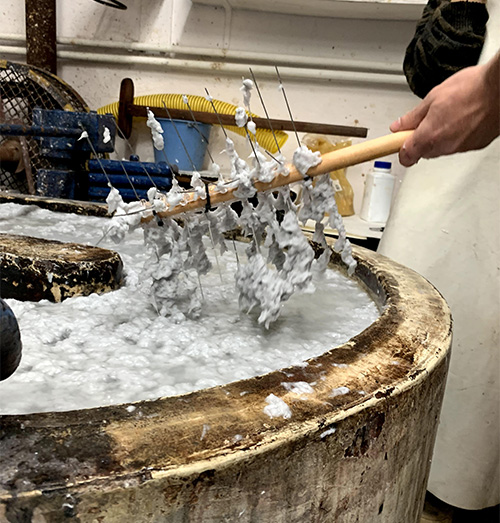SPAIN
The Elisava University and Girbau are examining possible uses for a new material made of lint that can be used in areas as diverse as casing, stationery or packaging.
According to Girbau, the Clint material is an important step towards zero waste in industrial laundry. Advanced Materials students in the Industrial Design Engineering course and in the Simultaneous Studies Program at Elisava, the University School of Design and Engineering in Barcelona and Girbau Lab, the open innovation platform at Girbau, have created Clint, a versatile, recyclable new material made from Textile waste that remains in the filters of the dryers. Clint is another step towards a new circular economy model in industrial laundry, in which waste is converted into a new material and converted to zero waste.
Similar to cardboard, Clint can be used in handicraft printing, for example. Clint returns to the essence of artisanal processes that are being created in collaboration with the Capellades paper mill, which has made the paper-like material for new uses and applications, and the letter cotton creative printing house, both of which are reviving crafting techniques and processes.
Elisava and Girbau are exploring other uses for this new material, of which there may be many. Among other things, Clint could replace plastics in the manufacture of pen drive housings or be used in stationery or packaging. The reuse of lint waste, which has so far been ignored and is a cost factor, makes it possible to minimize environmental pollution and promote a sustainable washing process.
Work towards the circular wash
Both Elisava and Girbau believe that Clint is a driver of sustainability because Clint is more than just a new material – it is part of a circular model that represents progress in the laundry business as it reduces textile waste, recovers it and offers new uses.
Girbau machines wash around 25,000 tons of laundry a day worldwide, and in Catalonia alone, an estimated 1,500 kg of waste is generated per week in industrial laundries. Clint is another step towards changing the mindset to focus on sustainability and strengthen circular models to reduce the environmental impact of industrial activities.
The project also gave Girbau the opportunity to give Elisava students the opportunity to get first-hand information about the business world and to work with the Girbau Lab experts on a real project to develop new materials and reuse laundry waste.
For his part, Elisava enters into agreements with companies and institutions to create added value through his students' innovation and research projects. Under these agreements, students, who are always supervised by industry professionals and school faculty, have the opportunity to work in real corporate environments in addition to the training they receive. The school also includes the Elisava circular, a committee that aims to reduce the facility's environmental footprint and promote good circular economy practices and practices.




